We’ve been recognizing the workers who are on the front lines of the pandemic such as health care workers, grocery store clerks and custodians.
On Thursday, the White House recognized another industry working hard to keep the economy moving – literally. Truck drivers and industry leaders were honored with a ceremonial key for their work.
“At a time of widespread shutdowns, truck drivers form the lifeblood of our economy,” said President Donald Trump during a ceremony celebrating truck drivers on the South Lawn. “For days, and sometimes weeks on end, truck drivers leave their homes and deliver supplies that American families need and count on during this national crisis and at all other times. They’re always there. Their routes connect every farm, hospital, manufacturer, business, and community in the country.”
The essential items like food and medicine wouldn't be sitting in your home if it weren't for the 3.5 million truck drivers across the country.
President Trump said truckers move over 70% of all freight in the United States, over 10 million tons every single year.
Since the pandemic started, those truck drivers have left the safety and security of their own homes to keep America's supplies moving, including some we spoke to who are making routes across Texas and the South.
“I go back-and-forth between Houston and Oklahoma so I can tell the difference with the lack of cars on the freeway now,” said Roderick Crow, Sr.
Local
The latest news from around North Texas.
Crow said he is moving grocery items and paper products, instilling a sense of purpose during this difficult time.
“It’s a sense of pride knowing that you can feed your family and feed other folks’ family. That’s what the best thing about it is,” he said.
Truck driver Irvinie Lacuesta runs routes across the South and throughout Texas. He most recently hauled steel and lumber to help keep the construction industry going. His favorite part about the new normal is less traffic on the roads.
“The traffic? I love it, no rush hour! We don’t have to deal with that anymore!” he said.
Truck drivers get paid by mile, so their deliveries much faster and efficient now.
But he said he misses the comradery he felt with other truck drivers on the road. Restrictions are preventing truck drivers from mingling, dining in or using bathrooms and showers at some locations.
“We don’t talk anymore. We just go to the bathroom and go back to our truck. That’s it, we don’t engage anymore,” he said.
The American Trucking Associations told NBC 5 when the pandemic began, they worked with the federal government to ease up several regulations that might slow down shipments, such as limits on how long truckers can drive.
“We needed to make sure that supply chain wasn’t interrupted,” said Dan Horvath, vice president of safety policy at the ATA. “Ensuring the drivers could continue to deliver and giving them more flexibility to do so was important.”
The ATA worked with the Federal Motor Carrier Safety Administration, which issued an emergency declaration to exempt many of these regulations and rules that govern what drivers can and cannot do.
“It was specific, it wasn’t a blanket free-for-all. It was specific to those engaged in direct supporting and ensuring the supply chain wasn’t compromised,” said Horvath.“The supply chain is working. The drivers are doing their jobs. More so now than ever have they got to get those shelves stocked all the time“
Some companies are shifting their business model and focusing on moving essential supplies.
“The neat thing that we’re seeing is that companies are adapting to this crisis. We’re seeing some companies that normally do deliveries specifically for restaurants, or high-end restaurants -- a lot of these restaurants have stopped operations throughout this ordeal so the trucking companies have changed their business model to make deliveries to other types of operations,” said Horvath.
Horvath said he is hearing of some places where truck drivers are not allowed to use bathrooms or showers, as well as wait times at supply warehouses increasing -- adding to the difficulty of the job. However, he said the ATA is working with companies to get personal protection equipment to truck drivers and to create pick up locations for drivers to stock up or refill on safety items.
Horvath also shared the community support for truck drivers across the country. Truck stops and law enforcement at inspection stations are surprising truck drivers with free lunches to keep them fueled up.
“It’s a shame it’s taken a pandemic like this to really show the deserved spotlight on the industry,” he said. “The men and women of the trucking industry have a difficult job on a normal day, let alone in the midst of a pandemic were experiencing now.”



